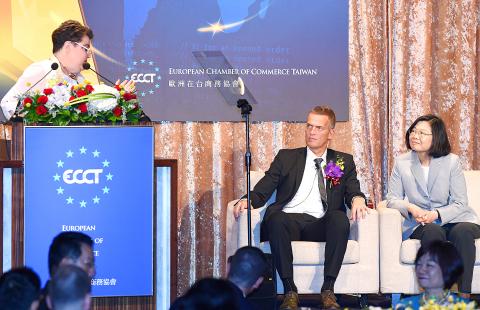The European Chamber of Commerce Taiwan (ECCT) on Thursday called for less hurdles for foreigners wanting live and work in Taiwan to solve its shortage of skilled labor.
“The government should make it easier for foreigners to live and work in Taiwan,” ECCT chairman Hakan Cervell told an audience that included President Tsai Ing-wen (蔡英文), senior government officials and executives from European and Taiwanese companies.
The foreign trade group, which has US$45 billion in direct foreign investments, lauded the labor law revision early this year and said the passage of the Act Governing Recruitment and Employment of Foreign Professionals (外國專業人才延攬及雇用法) was a good first step.

Photo: Liao Chen-huei, Taipei Times
However, further efforts are needed to make Taiwan business-friendly and attractive to foreign talent, it said.
Existing rules mean foreign nationals are treated unequally to Taiwanese residents, with different number formats for Taiwanese identity cards and Alien Resident Certificates, Cervell said.
The practice denies foreign resident card holders access to many services, as more services go online, he said.
Other examples of unequal treatment include foreign residents not being eligible for electric vehicle subsidies or senior citizen discounts on the High-Speed Rail service, he said.
The government could also resolve the shortage of skilled labor by introducing short-term business visas and allowing more foreign workers in the service sector.
The ECCT said it welcomes Taiwan’s effort to speed up the development of the “green” energy industry, but added that many obstacles need to be overcome if the nation wants renewable energy sources to supply 20 percent of electricity by 2025.
Challenges include constructing supporting infrastructure such as electricity grids and harbors, streamlining the permitting process, and resolving financial issues in line with international trends and standards, the chamber said.
“European companies in the wind energy industry are committed to developing Taiwan into a regional manufacturing and support hub for wind energy in Asia. However, it will take time to develop local competence and expertise,” Cervell said.
The ECCT said it supports the creation of smart cities, but the right infrastructure must first be put in place, such as 5G telecommunications, electric vehicle charging stations and smart grids, Cervell said, adding that the regulatory environment must be flexible enough to allow technological innovation and new business models.
The ECCT supports making English the second official language of Taiwan, as English is the global language of business, diplomacy and international organizations.
“Making English an official language would make Taiwan more attractive to international investors and give Taiwan more access to the world,” Cervell said.

Sweeping policy changes under US Secretary of Health and Human Services Robert F. Kennedy Jr are having a chilling effect on vaccine makers as anti-vaccine rhetoric has turned into concrete changes in inoculation schedules and recommendations, investors and executives said. The administration of US President Donald Trump has in the past year upended vaccine recommendations, with the country last month ending its longstanding guidance that all children receive inoculations against flu, hepatitis A and other diseases. The unprecedented changes have led to diminished vaccine usage, hurt the investment case for some biotechs, and created a drag that would likely dent revenues and

Global semiconductor stocks advanced yesterday, as comments by Nvidia Corp chief executive officer Jensen Huang (黃仁勳) at Davos, Switzerland, helped reinforce investor enthusiasm for artificial intelligence (AI). Samsung Electronics Co gained as much as 5 percent to an all-time high, helping drive South Korea’s benchmark KOSPI above 5,000 for the first time. That came after the Philadelphia Semiconductor Index rose more than 3 percent to a fresh record on Wednesday, with a boost from Nvidia. The gains came amid broad risk-on trade after US President Donald Trump withdrew his threat of tariffs on some European nations over backing for Greenland. Huang further

CULPRITS: Factors that affected the slip included falling global crude oil prices, wait-and-see consumer attitudes due to US tariffs and a different Lunar New Year holiday schedule Taiwan’s retail sales ended a nine-year growth streak last year, slipping 0.2 percent from a year earlier as uncertainty over US tariff policies affected demand for durable goods, data released on Friday by the Ministry of Economic Affairs showed. Last year’s retail sales totaled NT$4.84 trillion (US$153.27 billion), down about NT$9.5 billion, or 0.2 percent, from 2024. Despite the decline, the figure was still the second-highest annual sales total on record. Ministry statistics department deputy head Chen Yu-fang (陳玉芳) said sales of cars, motorcycles and related products, which accounted for 17.4 percent of total retail rales last year, fell NT$68.1 billion, or

MediaTek Inc (聯發科) shares yesterday notched their best two-day rally on record, as investors flock to the Taiwanese chip designer on excitement over its tie-up with Google. The Taipei-listed stock jumped 8.59 percent, capping a two-session surge of 19 percent and closing at a fresh all-time high of NT$1,770. That extended a two-month rally on growing awareness of MediaTek’s work on Google’s tensor processing units (TPUs), which are chips used in artificial intelligence (AI) applications. It also highlights how fund managers faced with single-stock limits on their holding of market titan Taiwan Semiconductor Manufacturing Co (TSMC, 台積電) are diversifying into other AI-related firms.